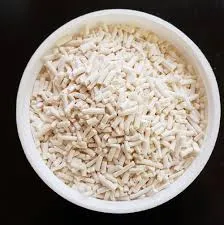
sodium benzoate and potassium sorbate preservatives
Sodium Benzoate and Potassium Sorbate Understanding These Common Preservatives
In the realm of food preservation, sodium benzoate and potassium sorbate are two widely used additives that play vital roles in extending the shelf life of various products. Both of these compounds are effective in preventing microbial growth, making them invaluable in the food industry.
Sodium Benzoate is the sodium salt of benzoic acid. It is commonly found in acidic foods and beverages, especially those with a pH of 4.5 or lower. Its effectiveness stems from its ability to inhibit the growth of bacteria, yeast, and molds. When sodium benzoate is added to food, it converts to benzoic acid in acidic conditions, which is the active form that provides its preservative qualities. This compound is commonly found in soft drinks, fruit juices, pickles, and condiments such as sauces and salad dressings.
One of the significant advantages of sodium benzoate is its ability to function as a preservative without altering the taste or appearance of the food drastically. However, concerns regarding its safety have been raised. Studies have suggested that, in high concentrations or when combined with certain substances (such as ascorbic acid), sodium benzoate may form benzene, a known carcinogen. Regulatory agencies, including the U.S. Food and Drug Administration (FDA) and the European Food Safety Authority (EFSA), have established acceptable daily intake levels to ensure consumer safety.
sodium benzoate and potassium sorbate preservatives

Potassium Sorbate, on the other hand, is the potassium salt of sorbic acid, known for its broad-spectrum antimicrobial properties. It is commonly used in the preservation of cheeses, baked goods, and a variety of beverages. Potassium sorbate works by disrupting the cellular function of microbes, thereby preventing spoilage and extending the product’s shelf life. Much like sodium benzoate, it is favored in foods because it does not significantly alter flavor or color.
Research has shown that potassium sorbate is generally well-tolerated and considered safe for consumption by regulatory agencies. It has, however, been linked to allergic reactions in some individuals, although such occurrences are relatively rare. The use of potassium sorbate has become so prevalent that it is often found in products marketed as natural or organic, despite its synthetic origin.
While both sodium benzoate and potassium sorbate are effective preservatives, the choice between them often depends on the specific food product and its pH level. Manufacturers must consider the desired shelf life, flavor profile, and potential regulatory compliance when deciding which preservative to use.
In summary, sodium benzoate and potassium sorbate are powerful tools in food preservation, each with distinct properties and applications. Their ability to enhance shelf life while maintaining the quality of food products is a testament to their importance in modern food science. However, consumers should remain informed about these additives and their implications on health, ensuring a balanced approach to food safety and enjoyment.
-
Pure Sodium Dichloroisocyanurate Dihydrate | Powerful DisinfectantNewsAug.29,2025
-
Industrial Chemicals: Quality & Purity for Every IndustryNewsAug.28,2025
-
Nitrile Rubber Honoring Strict Production StandardsNewsAug.22,2025
-
Aspartame Ingredients Honoring Food Safety ValuesNewsAug.22,2025
-
Fertilizer for Balanced Plant NutritionNewsAug.22,2025
-
Cyanide Gold Processing with High Purity AdditivesNewsAug.22,2025
-
Formic Acid in Textile Dyeing ApplicationsNewsAug.22,2025
Hebei Tenger Chemical Technology Co., Ltd. focuses on the chemical industry and is committed to the export service of chemical raw materials.
-

view more DiethanolisopropanolamineIn the ever-growing field of chemical solutions, diethanolisopropanolamine (DEIPA) stands out as a versatile and important compound. Due to its unique chemical structure and properties, DEIPA is of interest to various industries including construction, personal care, and agriculture. -

view more TriisopropanolamineTriisopropanolamine (TIPA) alkanol amine substance, is a kind of alcohol amine compound with amino and alcohol hydroxyl, and because of its molecules contains both amino and hydroxyl. -

view more Tetramethyl Thiuram DisulfideTetramethyl thiuram disulfide, also known as TMTD, is a white to light-yellow powder with a distinct sulfur-like odor. It is soluble in organic solvents such as benzene, acetone, and ethyl acetate, making it highly versatile for use in different formulations. TMTD is known for its excellent vulcanization acceleration properties, which makes it a key ingredient in the production of rubber products. Additionally, it acts as an effective fungicide and bactericide, making it valuable in agricultural applications. Its high purity and stability ensure consistent performance, making it a preferred choice for manufacturers across various industries.





